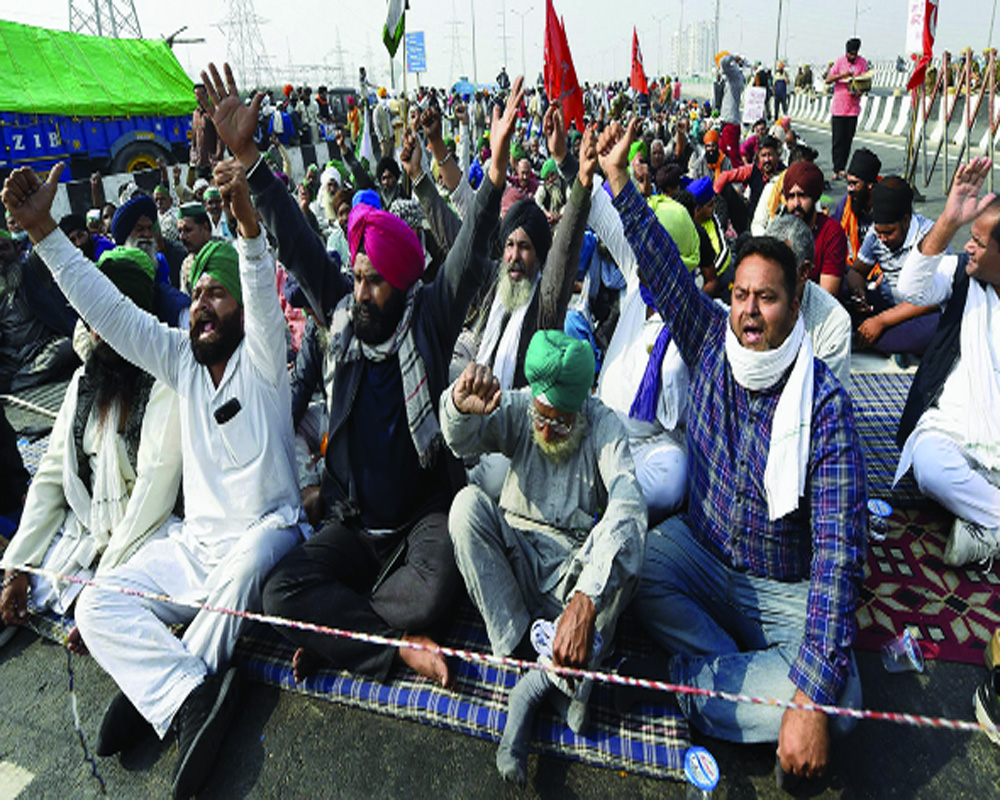The country should rather begin a new discussion on agriculture and crops, creating diverse food grain habits and sustaining ecology
In West Bengal not long ago, the Left Front government had a huge majority. Yet it had to eat a humble pie when farmers in Nandigram and Singur put paid to its industrialization plans. Maybe the state government’s plans were good, but it became immaterial in the face of farmers protesting acquisition. The situation is no different now. The Union Government said the three farm laws were for the benefit of farmers. A section of the farmers remained unconvinced. Finally, almost one year after their sit-in, they got what they wanted.
Where does the real power lie? Not in the government with its elaborate security setup. Not in Parliament where laws are made. Not in the Supreme Court which can unmake laws. Real power lies only with the people. That is what the year-long farmer’s agitation suggests.
This should make popular governments change their tack. The NDA government took the correct decision to junk the Land Acquisition Act and now, the farm laws. Those in power anywhere have to accept that if the beneficiaries are not satisfied such decisions cannot be implemented.
Former deputy chairman of NITI Aayog, Arvind Panagariya, says an important aspect that crops up is the World Trade Organisation (WTO) rules on subsidies. India so far escaped with a peace clause for violating them. He indicates that the demand for MSP, which WTO does not accept, may lead to a difficult global situation, apart from the fact that MSP would entail an extra payment of `1.5 trillion. He also stresses that the proposed massive transfers under MSP would bypass not only the urban poor but also the rural poor.
Any solution? Yes, either reform WTO or rethink on MSP. Or maybe listen to another former NITI Aayog deputy chairman, Raghuram Rajan, on a TV discussion on December 8. He emphasized that despite some good points in farm laws, agriculture needing reforms, India is so vast that decentralisation is essential. There could not be one solution for the entire country. India cannot be like China. He says, India’s strengths were democracy and debate. China became a manufacturing superpower following its system of authoritarian rule. “It would be difficult to emulate the Chinese path.”
Rajan gives the easy prescription. Governance should not resort to adamance and electoral numbers are never enough to roughshod the sentiments that may not look palatable to the ruling parties. The governments in the past also had to eat humble pies. The most glaring example was the rise of NT Rama Rao in 1980s against a despotic Indira Gandhi.
It should not be forgotten that even rich nations give farm subsidy and WTO ignores it.
In the present context, the cases went for judicial review but the court did not resolve the issue. Rightfully the popular government has taken the required decision. The government need not be apprehensive of the WTO or international bodies. If it could keep the environmental COP26 at bay for several decades, it can do so for farm issues too.
The country should rather begin a new discussion on agriculture, crops, creating diverse food grain habits and sustaining ecology. Today’s MSP issue is complex as farmer needs higher income. All the same the companies could not be allowed to have ways that bolster their profit at the cost the people’s interests.
India has to ponder whether it can put income inequality as high as it was under British colonial away from public discussion. The top 10 percent accounts for 57.1 percent of the income now. The top 10 percent earns 20 times, according to the World Inequality report 2022.
Despite a pan-India sentiment, it should not be forgotten that Nandigram or Singur or various long farmers’ marches in Maharashtra, Madhya Pradesh and other places did not become national economic issues. It needs to be to be seen if the MSP issue would rule the roost post-UP elections. In fact, this calls for diversification of farm products and less dependence on mono or select cropping that may have led to this difficult situation post-Green revolution.
The debate is now on reintroducing diversity in food habits. In 1881, it was a nation of 220 million people eating millets and other food grains. It has changed to eating a 1.3 billion rice-and-wheat eating behemoth riding the Green Revolution. India has not taken advantage of its strength of diversity of food items and agriculture depended on local ecology-led consumption.
The farmers' stir should encourage the government to create a farmer-dominated agriculture where no outsider needs to fix the MSP.
(The writer is a senior journalist. The views expressed are personal.)



























